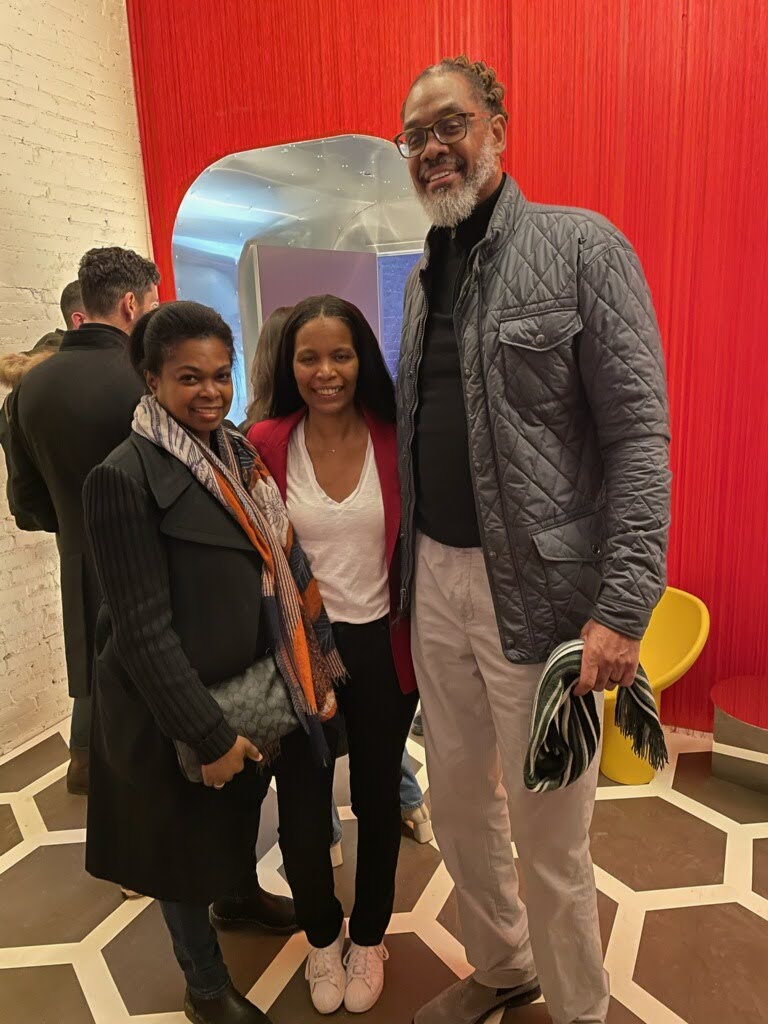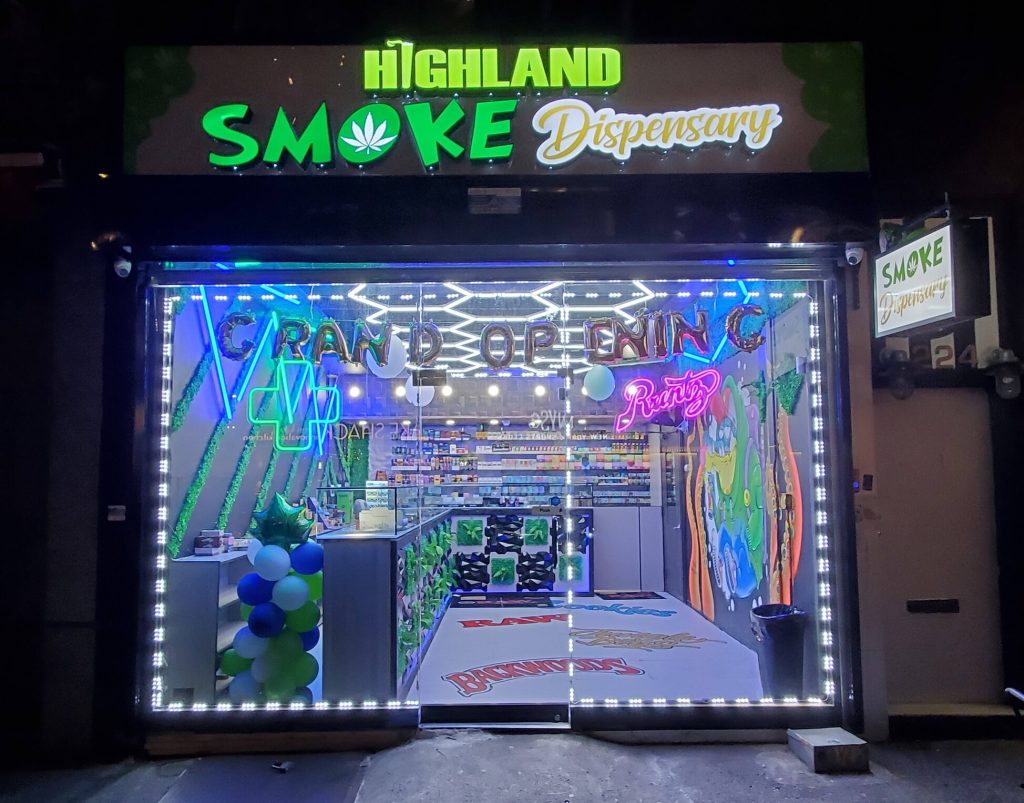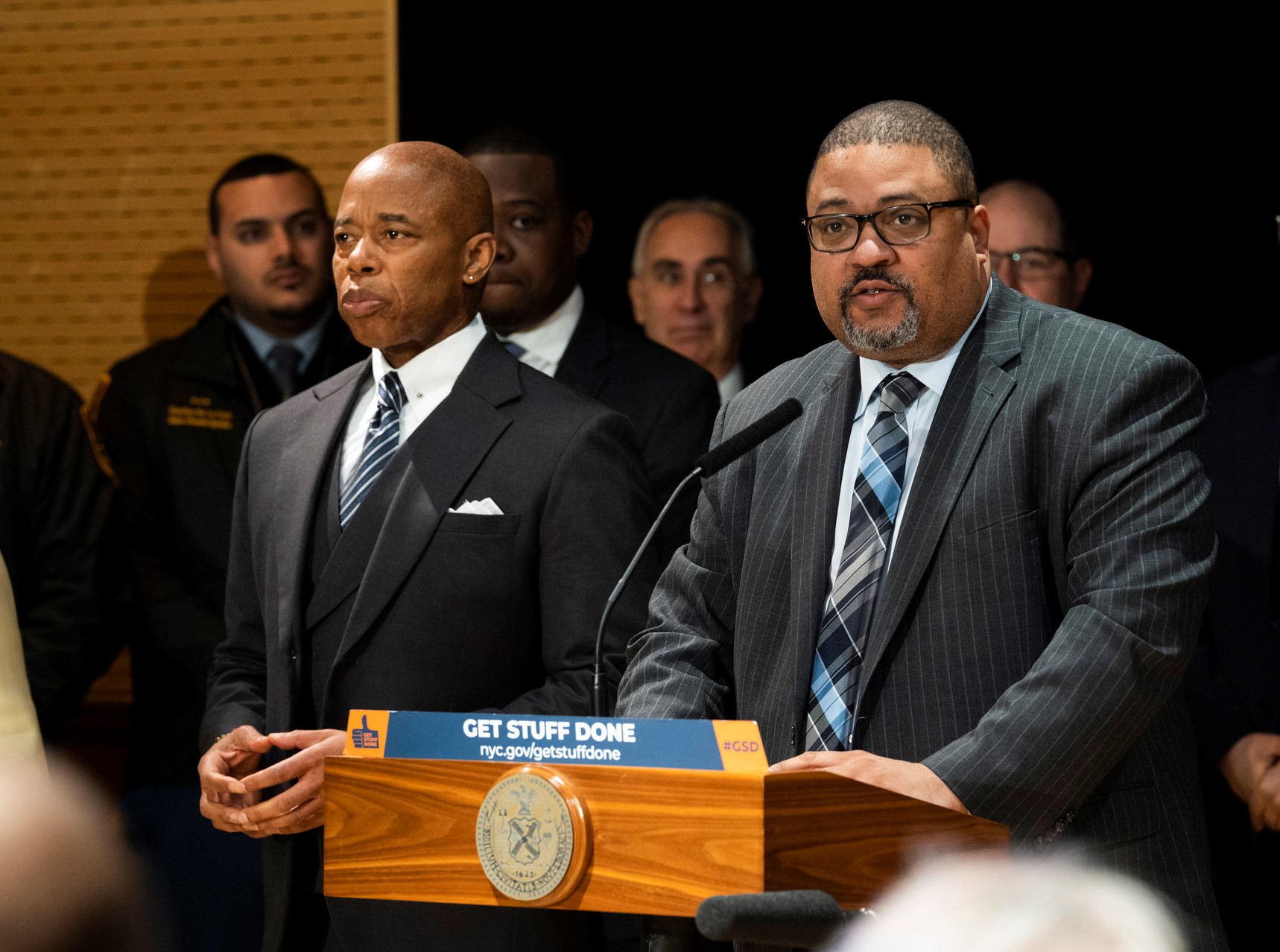BY LINCOLN ANDERSON | The third licensed pot dispensary in New York State is opening — and guess where? The Village, of course.
Union Square Travel Agency: A Cannabis Store is set to open Mon., Feb. 13, at “high noon” at 62 E. 13th St., a block south of Union Square, between Broadway and University Place.
The Doe Fund is the sponsoring organization of this latest legal weed retailer.
In late December Housing Works opened a dispensary on Broadway between Eighth Street and Astor Place, followed a month later by Smacked Village, which opened on Bleecker Street just west of LaGuardia Place.

Meanwhile, with the trio of new legal dispensaries now opened but licenses for hundreds others across the state ready to go, the city is ratcheting up its crackdown on the Big Apple’s estimated 1,400 existing unlicensed pot shops — by threatening to evict the scofflaw shops, plus continuing enforcement against the stores.
On Tues., Feb. 7, at a joint press conference with Mayor Adams, Manhattan District Attorney Alvin Bragg announced that his office has sent letters to the landlords of 400 unlicensed smoke shops in the borough, warning them that the D.A. is prepared, if necessary, to start evictions against the stores for selling unlicensed pot, untaxed cigarettes and “adulterated products.”
Adams and Bragg were joined at the announcement by cannabis officials, New York City Sheriff Anthony Miranda, Manhattan Borough President Mark Levine and Councilmembers Erik Bottcher, Carlina Rivera and Gale Brewer, among others.
Likening it to the ending of Prohibition, Bragg noted that the approval of New York’s Marihuana Regulation and Taxation Act on March 31, 2021, “didn’t mean just anyone could start selling homemade bathtub gin to their local store. Marijuana legalization in New York came with rules, and those rules must be respected,” he stressed.
In November, in a two-week, multiagency crackdown, the Sheriff’s Office issued 566 violations and seized $4.1 million worth of pot and pot products at 53 locations. Similarly, the New York Police Department seized 20 illegal weed trucks. Yet, there was seemingly nothing barring these places from simply continuing to do business and just selling untaxed ganja the very next day. Hence the D.A.’s new eviction-threat tactic.
The officials stressed that New York’s legal pot system is set up to funnel funds into communities that were harmed by past punitive pot laws — but that the illegal shops will undermine that plan.
“Very importantly, 40 percent of the tax revenues from legal cannabis will be invested back in the communities that were most harmed by prohibition,” Bragg said. “Those who flout the cannabis tax laws and regulations are robbing the very communities that suffered from marijuana criminalization for decades — communities that are finally on the cusp of benefiting from a just and equitable system. We cannot allow that. … Together, we can level the playing field for New York’s legal cannabis market and deliver on the promise of equity and fairness that legalization of advocates fought so long and hard for.”
The D.A. also thanked Councilmembers Bottcher, Rivera and Christopher Marte for being “on the front lines fighting these smoke shops in their districts.”
For his part, Mayor Adams vowed, “We’re not going to stand idly by and we won’t stop until every illegal smoke shop is rolled up and stubbed out.”
Adams also pointed out another issue with the illegal shops — namely, that they are a magnet for crime. According to police, the rogue reefer retailers are being repeatedly hit by the same offenders, in ongoing “robbery patterns.”
“These locations, believe it or not, if you’re doing an analysis, they’re starting to feed robbery patterns,” Adams said. “People realize that this is a cash business. They are targeting these businesses and it is causing a level of robbery in these locations.”
The Village Sun reported how, on Jan. 11, armed robbers knocked off Rainbow Smoke Shop, on Sixth Ave. between Waverly Place and Eighth Street, absconding with $1,800 in pot gummies and $600 in cash.
Similarly, Borough President Levine said of the illegal shops, “These are magnets for robberies. They have so much cash on hand, potentially tens of thousands of dollars of cash on hand. And so they are targets and that is making neighborhoods less safe.”
The mayor also warned about harmful substances possibly being contained in the illegal shops’ flower — specifically citing the ultra-dangerous fentanyl. However, the killer opioid so far has yet to be positively identified in any of the renegade shops’ pot.
“These products are not tested,” Adams stressed of the untaxed stash. “In some cases they could be laced with fentanyl. These are dangerous products, and the public must be aware of that. And New Yorkers have had enough.”
Adams declared the state’s new sinsemilla system can’t risk being sabotaged, noting, “Legal cannabis is expected to be a $1.3 billion industry, $40 million per year in tax revenues. This can be a real win for our city. And it will support 19,000 to 24,000 local jobs. And so we have a moral obligation, as well as a legal obligation, to ensure that it is done correctly.”
Also at the Feb. 7 press conference, the mayor announced that an enforcement action was being carried out that very day against four unlicensed East Village pot shops that had been caught selling to underage auxiliary police officers.
Sylvia Hinds-Radix, the city’s corporation counsel (head of the city’s Law Department), detailed that on three separate occasions, at each of the four spots, in the week from Dec. 15 to Dec. 22, an undercover auxiliary who was under age 21 did purchase weed at the shops.
“The sales included blunts, Mylar bags of cannabis labeled Savage New Year, Yellow Fruit Stripes, Premium Roll 2020, Future Bubble Gum and Dubz Garden Oreoz,” Hinds-Radix stated, adding the prices ranged from $25 to $30.
“The N.Y.P.D. tested the cannabis,” she said, “and let me highlight for you — there was no fruit or bubble gum or candy in these purchases.”
The “corp counsel” said her office is taking the stores’ owners to court and that if they fail to comply with the law, “we’ll seek a court order to close them down.”

Councilmember Brewer spoke of the explosion of illegal smoke shops in her Upper West Side district in the two years since adult recreational pot use was legalized. Within just the first year, she said, a survey by interns from her office showed the number of unlicensed smoke shops had increased tenfold. The B.P. then also resolved to conduct a little investigative work of her own.
“About half of them, we think at that moment last year, probably more now, were selling illegally,” she said of all the scofflaw shops. “I must admit, I wanted to see. So I go into a smoke shop around midnight on 86th Street. There’s a woman sitting there with her friend and I’m like, ‘What in hell’s name am I going to say? Because I don’t know what to say.’ So I said, ‘My bones hurt,’ because I’m old. And she said, ‘What do you need?’ So I knew that meant that there was something under the counter. That’s pretty common for all of these.”
Brewer said she was happy the sting operation hit some of the shops in her district — but not that one of them opened right back up. That showed stricter enforcement is needed, she said.
“We went to Zaza Waza Smoke Shop right near here, 87th Street,” Brewer recalled. “They were open the next day. All of the product was back on the shelf. And so the question is…we do need to think of what we’re going to do with the owners, I think, of these shops because we cannot deal with 1,400 in this way.
“And I believe even down in the Village, the ones that are near Housing Works, there are 11 illegal shops right near there,” Brewer added. “So we have to make sure that these illegal shops do not exist because the legal ones need to make it.”
Another reason to nip the illegal stores in the bud is because they are selling illegal vapes to youth, she noted.
“High schools and the kids are vaping,” Brewer said. “And it is not good for the kids. It’s not good for academics, not good for our city. And I saw underage kids — they looked like they were 12, the other day — in Zaza Waza.
“Also, some of these smoke shops are going [locating] within 500 feet of a high school and a school and 200 feet of faith-based [houses of worship],” she said. “And you know what? No liquor store does that. No restaurant does that that sells liquor. They know not to do this, but these shops just do it.”


This is very interesting.
The city, at the moment has incredible problems with crime, violence, and, quite frankly, filth.
So, the incredibly inept city government, has allowed an incredible number of shops to sell pot.
…illegally…
I can’t help but think about the owners of the shop at 144 Bleeker…
The city made it a political point to grant these folks a “license“ to sell pot in the city.
I am sure they pay a good deal of money for that privilege.
I am also sure that they pay an extreme amount of rent on that storefront at 144 bleeker…
So i ask…in a city riddled with crime, with little or no resources to stop it…
How are they going to close all the illegal shops?
..they will not..
Obviously…it is just Lip Service from the Mayor…
Who let this situation unfold..
I feel so sorrowful for the owners of 144 Bleecker..
They thought they would have an exclusive product
I am sure they felt they could pay down the start up debt with that exclusivity…
Wrong….anyone can buy pot in a multitude of places within 2 blocks…no tax, no hassle.
This is a situation created by the people who run this city.
They are obviously not looking out for the best interests of the people.
They are more interested in social justice.
As the crime and filth keep getting worse.
Agree 100%. Plus, our sons and daughters attend college at Cooper Union. Politicians have made the Astor Place neighborhood dangerous by having cash-only pot shops.